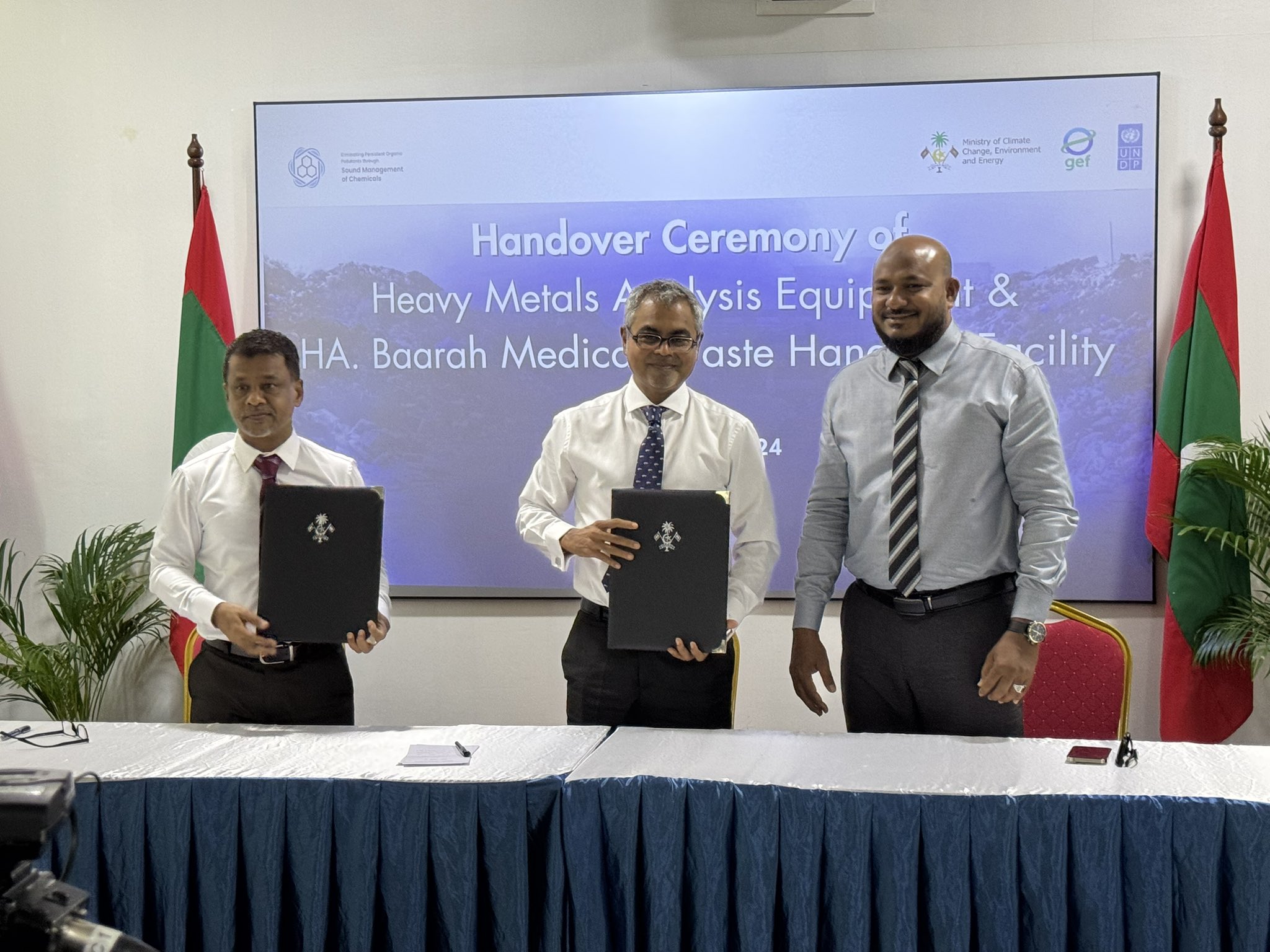Advancing Environmental Protection: Progress in Eliminating Persistent Organic Pollutants (POPs)
December 21, 2024

Progress in Eliminating Persistent Organic Pollutants (POPs)
UNDP Maldives, in collaboration with the Ministry of Climate Change, Environment and Energy (MCCEE) and supported by the Global Environment Facility (GEF), continues to make strides in addressing the risks posed by Persistent Organic Pollutants (POPs). These hazardous chemicals pose significant threats to human health and the environment, making their elimination a crucial step towards sustainable development in the Maldives. The Eliminating POPs through Sound Management of Chemicals project aims to achieve Environmentally Sound Management (ESM) and disposal of hazardous chemicals by establishing policy frameworks as well as strengthened national capacity. The project also targets to establish systems for said sound collection, storage and disposal of hazardous chemicals, and increasing awareness and outreach on the effects of POPs on human health and environment.
A Joint Project Steering Committee (PSC) meeting for the GEF-6 POPs project and the GEF-7 ISLANDS Child project was held on 11 December 2024. At the meeting, synergies among the two projects and implementation progress were presented, and challenges being faced were addressed. The committee also endorsed the work plan, budget and procurement plan for 2025.
Key Achievements
Elimination of 24 tonnes of PCB contaminated transformers and switchgears: 17 decommissioned switchgears and 14 transformers including 5 tonnes of transformer oil were safely transported from various locations in Fuvahmulah and Addu City to Addu Interim Hazardous Waste Storage Facility (IHWSF) for safe storage until their re-exportation for sound disposal. Thirty industry related workers based in Addu city were given training on PCB waste handling and disposal, after which the PCBs were safely drained, packed and then shipped to Sarpi Veolia PCB Decontamination Centre in Belgium, where they were safely disposed by August 2024.
Medical Waste Handling Facility (MWHF) in HA. Baarah: The first of its kind to be established in a health centre in the Maldives, this facility will replace open burning of hazardous medical waste with environmentally sound best practices to protect public health and the environment. Memorandums of Understanding (MoU) signed with Ministry of Health (MoH) and handed over in October.
Inductively Coupled Plasma Mass Spectrometry (ICP-MS) equipment: Supplied to the National Health Laboratory (NHL), this advanced tool will detect heavy metals such as mercury (Hg) and lead (Pb) in various mediums, contributing to informed policymaking on environmental health issues. Delivered to the NHL and MoU signed with MoH for handover.
Establishment of the Addu IHWSF: Construction and Final inspection completed for the facility with development of the Standard Operating Procedure ongoing.
Study visit to PCD, Thailand on sound management of hazardous chemicals: Enforcement officers of Maldives Customs Services and officials from other stakeholder institutions took part in a 3-day study visit to the Pollution Control Department (PCD) of Thailand on implementation of regulations and procedures on the transboundary movement of hazardous wastes and chemicals in alignment with the Basel convention, as well as demonstrations on container inspections Bangkok Port where e-waste misdeclaration cases are detected and managed. 34 participants joined this study visit.
HAZWOPER training: 44 participants from 12 stakeholder institutions completed training on Hazardous Waste Operations and Emergency Response (HAZWOPER) guidelines and procedures.
Second training of the series of trainings on gender dimensions in chemicals management: Training of Trainers for the 7 projects of the VESHI small grants programme were given training on Gender & Chemical Risks Considerations and the Gender Action Plan (GAP) of the POPs Project to integrate gender perspective and establish gender safeguards in project implementation.
Upcoming Milestones
The POPs project has been greenlit for an 18-month no cost extension backed by an accelerated implementation plan to achieve:
Supply of consumables for the ICP-MS in January 2025
Operationalization of the IHWSF in Addu City, with handover to WAMCO planned for early 2025.
Establishing an Interim Hazardous Chemical Storage Facility in R. Vandhoo, which will collect and safely store hazardous chemical waste for re-export and disposal.
These initiatives mark a significant step forward in tackling hazardous waste management, safeguarding public health, and ensuring a cleaner, safer environment for future generations in the Maldives.

Medical Waste Handling Facility (MWHF) in HA. Baarah

Handover of Inductively Coupled Plasma Mass Spectrometry (ICP-MS) equipment

Stakeholder Consultations for Developing SOP for the IHCWF in Addu City

 Locations
Locations